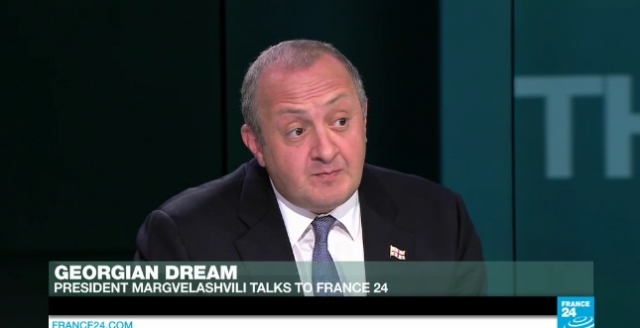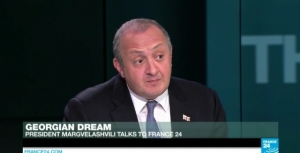Margvelashvili Says Georgia Will Never Accept Russia’s Annexation of S. Ossetia
PARIS – Georgian President Giorgi Margvelashvili said in a televised interview Sunday with France 24’s Robert Parsons that Georgia would never accept Russia’s attempt to annex slowly the breakaway regions of Abkhazia and South Ossetia.
“We chose a very clear vision with respect to Russia. We said that we would negotiate with Russia and talk on a rational basis…the Georgian state is occupied by Russia’s military. They have created artificial states on our territory. This is unacceptable. Georgia will never accept annexation…or occupation and the attitude that a neighboring, powerful nation has towards us.”
Margvelashvili said he believes normalized relations with Russia can continue so long as both sides treat each other with respect and as equals.
Discussing Georgia’s upcoming parliamentary elections, Margvelashvili praised the robust debates common amongst Georgians, saying the greatest achievement of more than a decade of political and economic reform has been the openness and plurality that Georgians enjoy in their political system.
“Georgians are actually actively engaged in politics…People truly care about politics; they care about politics,” Margvelashvili said while also noting that up to 60 per cent of registered voters say they are disillusioned with the current situation in the country.
Margvelashvili strongly urged Georgian voters to shed their disillusion and exercise their right to vote by turning out in high numbers for the October 8 parliamentary elections.
“The political parties have to be much more active and go out there to campaign. I will actually be active, advocating for people to get out and vote for anyone, any political party they want. But we must have active voters,” Margvelashvili said when asked about his expectations for the upcoming elections.
Margvelashvili deflection a question about criticism of his Georgian Dream coalition regarding the persecution of the opposition United National Movement, Margvelashvili said the government welcomes and takes into consideration all types of criticism as it helps move society closer towards European integration.
Though he refused to comment on a possible return of former president-turned governor of Ukraine’s Odessa Region Mikheil Saakashvili to Georgia later this year, Margvelashvili said it was up to the voters to decide if Saakashvili has a future in the country.
When speaking about Georgia’s billionaire oligarch Bidzina Ivanishvili – the founder of the Georgian Dream coalition and a controversial figure due to his political influence over the country, despite not holding elected office – Margvelsashvili denied having had any direct contact with Ivanishvili or having been forced to carry out his policies.
“I’ve personally never been pushed by him on any particular issues. He is, however, apparently active with his political force...He apparently has communications with them,” said Margvelsashvili.
He added that Ivanishvili’s involvement in Georgia’s political process should be expected due to his influence and contributions to the country’s growth.
Margvelsashvili adamantly stressed that Georgia’s future as a society would be closely tied to the country’s historically deep-rooted European values of democracy, progressivism and tradition.
“We are culturally a very European nation. That means...having traditions or some kind of values, but at the same time giving another person the right to have free choice on any that matters for them. Of course, we are coming from a very closed empire, the Soviet empire, and the emancipation of personal freedoms takes time. But we are a European culture,” Margvelashvili said.
By Nicholas Waller












